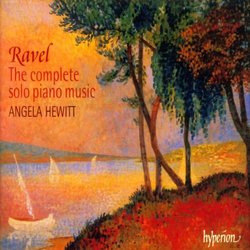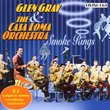| All Artists: Maurice Ravel, Angela Hewitt Title: Ravel: The Complete Solo Piano Music Members Wishing: 1 Total Copies: 0 Label: Hyperion UK Original Release Date: 1/1/2002 Re-Release Date: 5/14/2002 Album Type: Import Genre: Classical Styles: Chamber Music, Historical Periods, Classical (c.1770-1830) Number of Discs: 2 SwapaCD Credits: 2 UPC: 034571173412 |
Search - Maurice Ravel, Angela Hewitt :: Ravel: The Complete Solo Piano Music
 | Maurice Ravel, Angela Hewitt Ravel: The Complete Solo Piano Music Genre: Classical
Taking time off from her definitive series of J.S. Bach recordings, Angela Hewitt here brings us the complete solo piano music of Ravel. Anyone who wondered whether this seemingly dyed-in-the wool Bachian might stumble sho... more » |
Larger Image |
CD DetailsSynopsis
Amazon.com Taking time off from her definitive series of J.S. Bach recordings, Angela Hewitt here brings us the complete solo piano music of Ravel. Anyone who wondered whether this seemingly dyed-in-the wool Bachian might stumble should rest assured: this is a stunning double-disc. As Hewitt makes clear in her characteristically illuminating liner notes, Stravinsky's jibe that Ravel was "only a Swiss clock-maker" was hopelessly off the mark. "One doesn't need to open one's chest to show that one has a heart," said Ravel, and in these often understated recordings, one is made to feel his point powerfully. "Scarbo" is all the more dramatic through the suppressed excitement Hewitt's playing exudes. "Ondine" and "Le Gibet" are at once immaculately controlled and intensely atmospheric. In addition to those works most frequently played, we also get rarities, like "Sérénade grotesque," written when Ravel was 18, and not published until 1975. As Hewitt points out, Ravel's favorite composer was Mozart, and she plays him with a Mozartean subtlety of nuance. --Michael Church Similar CDs
|
CD ReviewsRiveting Ravel 05/28/2002 (5 out of 5 stars) "Angela Hewitt, already known for her excellent interpretations of Bach's piano works, has turned her attentions to Ravel with equal effect. Her well-researched and accessibly-written liner notes alone are worth the price of the CD and it is clear that the research has not been just an intellectual exercise. Her playing is informed and technically splendid and the album benefits from a fine piano and good acoustics, essential elements in recording Ravel.I enjoy Angela's chameleon-like ability to play Bach as Bach, Ravel as Ravel, Granados as Granados, etc...Her technique is marvellous but, unlike many other great pianists, her ego takes a back seat and lets the composers/compositions shine in their own right." More than a 'Bach Specialist' Alan Lekan | Boulder, CO | 05/25/2005 (5 out of 5 stars) "Taking a break from her vast Bach cycle for Hyperion Records, Angela Hewitt puts her mind and fingers to the very different musical challanges of Maurice Ravel and the 19th-century French romantic-modern style. Well, all here is not completely divergent from Bach's music as Ravel's "Le Tombeau de Couperin" is a "Bach or Couperin-like suite" containing a prelude, fugue, menuet and toccata - but, of course, not sounding anything like either of the Baroque masters! Regardless of the composer in question, Angela Hewitt is known for delving deep into a composer's life and music to emerge with the purest, most representative essence of each work. Accordingly, her readings in general stay true to the score and intent of the composer and are a good reference point with minimal "outside influences." Accordingly, her Ravel conceptions here are very idiomatic to the man and his era. Having "one foot in classicism, another in Romanticm and yet another in Modernism," Ravel's music fascinates with its combination of clarity of form, evocative harmonies, gentle nuances and curiously shifting tonalities. Angela Hewitt's finesseful style is well suited to Ravel's often delicate, imagery-rich music with her lovely phrasing, feathery touch, and ability to achieve the beautiful tonal colorations so characteristic of French music of this period. As often stated about French music, "It is always meant to be beautiful," and Angela Hewitt sure can create beauty in this music. Ravel's dreamy, cascading pieces (Sonatine, Jeaux D'eau, Ondine and Miroirs) are conveyed with the lightest of texture, nuanced lyricism and feminine touch that can make Ravel sound so enchanting. Never a harsh note is heard. This pianist especially excels in drawing out the poignancy of Ravel's more introspective works like the Pavane or Menuet d'Haydn. In these, her line is heart-felt and beautiful. Yet, Hewitt can create a strong sense of drama and intrigue when needed in works like the early Serenade Grotesque or the highly intelligent Valses Nobles. Her Alborada (Miroirs) is hot and spicy - a fine tribute to Ravel's Spanish-Basque roots. Equally delectable are her crystalline chromatic textures and exacting rhythms in pieces like the Prelude, Forlane and the Chabrieresque Rigaudon of "Le Tombeau." Hewitt really brings out the best in Ravel's most curious and fascinating music. As many know, one of Ravel's most significant and famous piano works is 'Gaspard de la nuit' which is something of a top pianist's 'right-of-passage' due to the immense virtuosity required. Probably the most riviting performance of "le Gaspard" was by Martha Argerich in a live concert (EMI). Some say you have not lived until you've heard Argerich's performance which is one of her most exciting on record. Contrastingly, Hewitt's approach the this daunting piece is one of more subtlety and precision of passage work, shunning sheer bravura. This is most notable in the last movement, Scarbo (an eerie being from the literary work who haughts at night). In this movement, Martha Argerich gives us a Scarbo that is indeed fully terrifying with her quicksilver virtuosity that haughts its victim more through sheer power (created through speed and volume). In contrast, Hewitt's Scarbo is more subtle and insideous - created from nuances of shading/tempo/dynamic. Both evoke an ominous atmosphere but in a different way. Certainly Hewitt's Scarbo is more 'tame' - but perhaps more stealthy and cunning than Argerich's overtly sinister Scarbo. Hewitt brings a real crystal-clarity to this third movement; but for some, it may lack drama and "punch" - but all do compared to Argerich's electrifying reading. But, to Hewitt's favor is the Sonatine where her delicate and ethereal playing far surpasses Argerich's hyper-paced reading which never quite finds the gentle emotional center (a common critique of Martha's readings). This is a very fresh, inspiring set that critics have taken note. This 2001 set received very high marks from both Gramophone and Penguin who herald Hewitt as having achieved status among the great pianists recording Ravel. Pretty good for a so-called "Bach specialist." The more I listen to Angela Hewitt's talent, the more I appreciate this pianist's esprit, range of repertoire and ability to create tonal beauty in anything she sets her hands to on the piano. The sound quality is excellent (rich and full) as are the 14 pages (!) of SUPERB program notes (which include the full text of literary work, "le Gaspard de la Nuit"). These are some of the finest notes written and were immensely helpful to understand more fully this programmic piece as well as the context and history of all works. Ravel's fascinating piano music was a very pleasing revelation to me this year, and I consider this two-CD set one of the treasures in my collection - as I do pretty much all of Hewitt's ever-growing and superb-quality discography. if you like this set, you should check out Hewitt's 2006 release of Chabrier piano music which is equally fascinating." Riviting Ravel Alan D. Hewitt | PHILADELPHIA, PA United States | 02/26/2003 (5 out of 5 stars) "Absolutely beautiful overall, powerful when needed, delicate when appropriate and always sensitive to what, I believe, were Ravel's intentions. But these are also fresh interpretations that I felt that I was listening to for the first time, especially the "Pavan." I have almost all of her Bach recordings and I am in the process of wearing them out! The Ravel is on that same level. Very highly recommended, even if you don't care for Ravel.Alan Hewitt (no relation, to the best of my knowledge)"
|

 Track Listings (19) - Disc #1
Track Listings (19) - Disc #1



